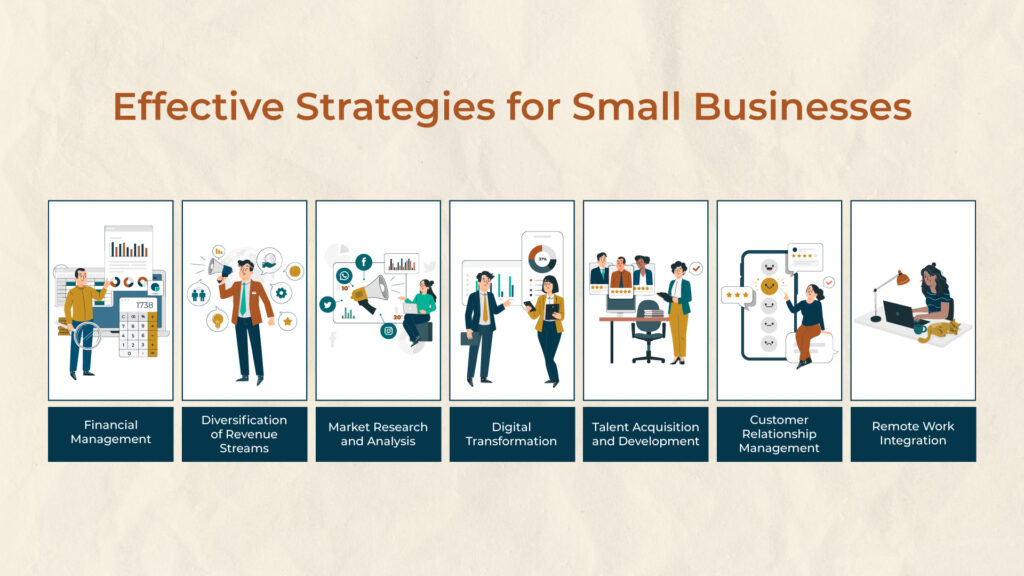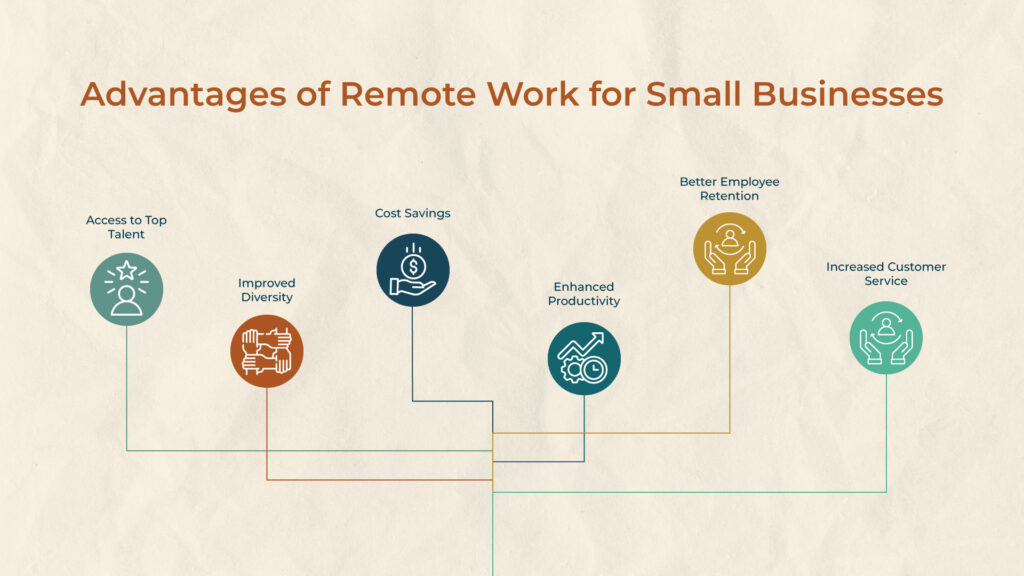
Small businesses play a crucial role in driving economic growth and fostering innovation. However, surviving and thriving in a competitive market requires more than ambition—it demands strategic planning and deliberate actions. In this article, we are going to explore effective growth strategies tailored for small businesses. From diversifying revenue streams to embracing digital transformation, these approaches can propel your business toward sustainable success. We will also learn about strategic remote staffing, including how to leverage remote work in the Philippines as a viable business strategy.
Importance of Strategic Growth Planning
Without a clear roadmap, companies risk drifting aimlessly or missing out on opportunities. Here’s why strategic planning matters:
Vision and Direction: A well-defined growth strategy lays a clear blueprint for the company’s future, ensuring everyone is on the same page. It helps align the team’s efforts and resources toward achieving common goals.
Adaptability: Companies need to adjust quickly to new circumstances to stay afloat. Strategic planning provides flexibility while retaining focus.
Resource Allocation: Allocating resources efficiently, whether financial, human, or technological, is essential for growth.
Strategic growth planning is the compass that guides small businesses towards their desired destination. Let’s look at effective growth strategies small businesses can focus on.
Effective Strategies for Small Businesses

Financial Management
The foundation of strategic growth is solid financial management. Businesses may safeguard their financial stability, allowing them to take advantage of opportunities and weather economic uncertainty, through careful budgeting, effective management of cash flow, and well-informed investment decisions.
- Budgeting: Budgeting helps owners manage resources, track money, and make informed decisions, helping small businesses prosper. It helps with cash flow management, provides an overall financial picture, enables for spending savings or revenue growth, and sets achievable goals.
- Funding Opportunities: Selecting the proper financing helps businesses flourish. Explore grants, loans, or investment options for small business expansion.
Market Research and Analysis
Informed decision-making is dependent on thorough market research. Strategic market research and analysis assist firms understand industry trends, customer behavior, and competitive landscapes, allowing them to identify opportunities, analyze risks, and fine-tune strategy accordingly.
Stay informed about market trends and customer needs:
- Market Research: Regularly analyze market data to identify emerging trends and opportunities.
- Competitor Analysis: Understand your competitors’ strengths and weaknesses to differentiate your offerings.
Diversification of Revenue Streams
Revenue diversification is essential for stability and resilience. Companies can reduce income dependence risks by entering new markets or offering complementary products/services. Here’s how:
Expand Product/Service Offerings
- Market Research: Identify unmet needs or gaps in your target market. Develop complementary products/services that fill these gaps.
- Cross-Selling: Upsell multiple products to your existing customers. For example, a web design agency could also provide content writing services.
Develop Complementary Revenue Streams
Look into complementary revenue streams:
- Subscription Models: Offer subscription-based services or products. Think of software-as-a-service (SaaS) models or membership programs.
- Affiliate Marketing: This is a great way to make commissions by promoting the products of other companies.
Digital Transformation
Increased productivity, better service for customers, and a leg-up in the market are all benefits of incorporating technology into business processes. Staying relevant requires businesses to constantly adapt to technological changes.
Streamline your Operations
Embrace technology to streamline your business operations:
- Cloud Solutions: Use cloud-based tools for collaboration, data storage, and scalability.
- Automation: Automate repetitive tasks to free up time for strategic decision-making.
Digital Marketing Strategies
Reach a wider audience through effective digital marketing:
- Social Media: Leverage platforms like Facebook, Instagram, and LinkedIn to engage with potential customers.
- Content Marketing: Create valuable content (blogs, videos, infographics) to establish authority and attract leads.
Talent Acquisition and Development
For sustained growth, it is critical to train and educate employees. Strategic recruitment, together with ongoing training and development initiatives, ensures that companies have the necessary people to drive innovation and meet changing market demands.
Attracting Top Talent
Invest in attracting and retaining skilled employees:
- Competitive Compensation: Offer competitive salaries and benefits to attract top talent.
- Remote Work Opportunities: Highlight remote work options to appeal to a diverse talent pool.
Employee Training and Development
Foster growth and innovation through continuous learning:
- Training Programs: Provide ongoing training to enhance skills and keep employees updated.
- Mentoring: Pair experienced employees with newer team members for knowledge transfer.
Customer Relationship Management
Building consumer relationships is crucial to long-term success. Customer relationship management involves understanding and addressing client needs, offering excellent service, and adapting to feedback to promote client loyalty and retention.
Personalized Experiences
Strong customer relationships drive loyalty and referrals:
- CRM Systems: Implement customer relationship management (CRM) tools to track interactions and personalize communication.
- Feedback Mechanisms: Gather feedback from customers to improve products and services.
Strategic Partnerships
Form strategic alliances to expand your reach and capabilities:
- Industry Partners: Partner with complementary businesses to cross-promote and share resources.
- Joint Ventures: Collaborate on specific projects or ventures to achieve mutual goals.
Remote Work Integration
Remote work or working from home (WFH) isn’t just a pandemic response—it’s a strategic growth opportunity. Small businesses can tap into the global pool of top-notch talents at a fraction of the cost. In addition, companies can hire remote workers while reducing operational expenses such as physical office and utilities.
Here’s how remote staffing could provide significant benefits.
How Small Businesses Benefit from Remote Work

- Access to Top Talent: Remote work helps firms to tap into a larger talent pool by providing openings to candidates from varied locations, helping them to identify the best fit for the job.
- Improved Diversity: Accepting remote work allows firms to establish a more varied workforce by hiring individuals from various backgrounds and regions, building a richer and more inclusive organizational culture.
- Cost Savings: Working from home can result in considerable cost savings for businesses by lowering overhead expenses associated with maintaining physical office spaces, such as rent, utilities, and office supplies.
- Enhanced Productivity: Studies demonstrate that remote workers frequently report higher production levels than in traditional office settings, with 85% of organizations reporting increased productivity when employees have flexible work arrangements.
- Better Employee Retention: Offering remote work options can improve employee retention rates by providing flexibility and work-life balance, leading to higher job satisfaction and loyalty among employees
- Increased Customer Service: Employees who can work from anywhere ensure ongoing support and response to customer needs.
- Access to Top Talent: Remote work helps firms to tap into a larger talent pool by providing openings to candidates from varied locations, helping them to identify the best fit for the job.
Tap into Remote Work in the Philippines for Your Business
Outsourcing, offshore, and remote work in the Philippines have all gained prominence due to the various advantages they offer to companies. The country’s commitment to English proficiency from a young age gives a strong workforce that is fluent in the language, and it also has a vast pool of talented people who speak English.
iSWerk, Your Trusted Partner in Remote Work
Small businesses must adopt a holistic approach to the journey toward sustainable growth. As your reliable remote staffing partner in the Philippines, iSWerk is here to help you through strategic planning, remote staffing, talent development, digital transformation, and customer-centric practices.
Discover how we can empower your business together through a
NO-OBLIGATION CONSULTATION.
